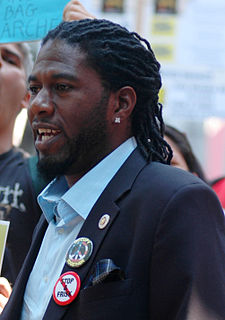A Quote by Angela Davis
I think that the response to the OJ Simpson trial was based on a kind of sensibility that emerged out of the many campaigns to defend black communities against police violence.
Related Quotes
Unfortunately I feel like a lot of the issues that the show [OJ Simpson ] was dealing with are still very much in the forefront of the American consciousness and the world consciousness today. Police misconduct was at the heart of the defense and Johnny Cochran did a masterful job at putting that defense at the forefront of the jury's conscience as opposed to the double homicide of Ron [Goldman] and Nicole [Brown Simpson].
To me, one of the big silver linings of the Simpson trial is the advances we've made in understanding domestic violence as a lethal problem. Before that trial, I think there was a widespread sense that it was a family affair, a normal part of a relationship, not really a crime. The reality is that it's very much a crime, and a very serious one.
Many White people are not sensitive to the kind of abuse that African Americans, especially younger African Americans, receive at the hands of police officers and police departments. I think for most Whites their experience with the police has been good or neutral because they don't interact with the police as much as those in the Black community.
Mass incarceration is a policy that's kind of built up over the last four decades and it's destroyed families and communities, and something we need to change. And it's fallen disproportionally on black and brown communities, especially black communities, and it's kind of a manifestation of structural racism.
Capitalism, in my estimation, is not about democracy. I think we're beginning to see an understanding of this. We see it in the Black Lives Matter movement. We see it among black youth who are now struggling and trying to make connections internationally with other groups and trying to figure out what's going on in the world and the ways things like police violence and systemic violence all come together under neoliberalism.





































